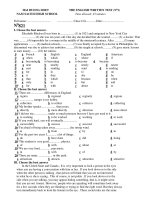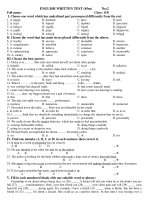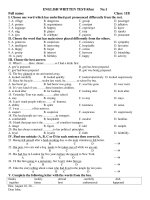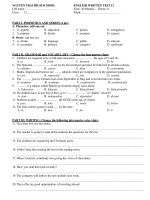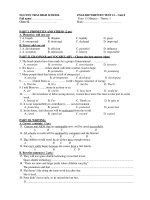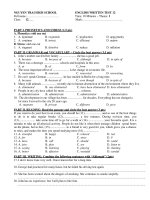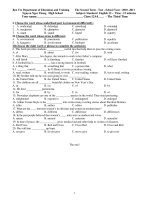ENGLISH WRITTEN TEST – 1st 06 – 06 – 2011 pot
Bạn đang xem bản rút gọn của tài liệu. Xem và tải ngay bản đầy đủ của tài liệu tại đây (51.51 KB, 7 trang )
1
YEN LAC HIGH SCHOOL ENGLISH WRITTEN TEST – 1st
Win – 12D 06 – 06 – 2011
============================
Question I: Circle the letter before the word whose underlined part is pronounced differently from
those of the others. (5 points).
1 A float B broad C goat D coat
2. A office B promise C service D expertise
3. A physical B mythology C rhythmic D psychological
4. A danger B angel C anger D magic
5 A black B blade C blab D black
Question II: Choose the best option: (a), (b), (c) or (d). Write your answers in the box below. (24
points).
1. Alex didn't come to see the film last night because he _____ it before.
(a) saw (b) had seen (c) has seen (d) was seen
2. A cold wind _____ for the last three days.
(a) has been blowing (b) blows (c) is blowing (d) blew
3. I wish I _____ younger.
(a) had been (b) would be (c) were (d) have been
4. She said she _____ to me, but she didn't.
(a) would have
written
(b) will have written (c) would write (d) will write
5. She told him that if he _____ his promise, she _____ speak to him again.
(a) break-would
never
(b) break - will never (c) broke - will never (d) broke-would never
6. I'll see you in August when I _____ back.
(a) will come (b) came (c) will have come (d) come
7. We were very pleased the service.
(a) with (b) on (c) at (d) from
8. He mumbled throughout his speech so I could understand a single word.
(a) really (b) fully (c) hardly (d) hard
9. I have told her not to do that and yet she always does.
(a) admittedly (b) repeatedly (c) wholeheartedly (d) frankly
10. It was a very long day but we arrived in time for tea.
(a) eventfully (b) unusually (c) dully (d) eventually
11. What would you like to eat for lunch? I don't mind.
(a) Nothing (b) Something (c) Everything (d) Anything
12. I asked if wanted an ice cream.
(a) anyone (b) someone (c) everyone (d) no one
13. The steamer Mongolia was built iron.
(a) from (b) by (c) with (d) of
14. Two men were walking up and down the dock at Suez the crowd of natives
(a) within (b) among (c) in (d) between
15. "You say, consul," Fix asked for the twentieth time, "that this steamer is never schedule?"
(a) behind (b) before (c) after (d) off
16. ____ from Bill, all the students said they would go.
(a) Except (b) Only (c) Apart (d) Separate
17. If only he ________ told us the truth in the first place, things wouldn't have gone so wrong.
(a) had (b) has (c) would have (d) should have
2
18. You may think that this is a job for someone who is applying for a marketing post.
(a) peculiar (b) stranger (c) usual (d) typical
19. Suddenly ______hungry, he stopped to buy a bar of chocolate,
(a) felt (b) having felt
(c) feeling (d) feels
20. Everyone thought she would accept the offer. _________, she turned it down
(a) However (b) So (c) Too (d) Moreover
21. I am sure I could very easily all the requirements
(a) complete (b) fulfil (c) commit (d) finish
22. He says he will pay ; I don’t think he will ,___________
(a) though (b) even though (c) in case (d) but
23. Safety should come first. _____ lives shouldn’t be put at risk
(a) People (b) Peoples (c) People’s (d) Peoples’
24. Would you be _______ my letters while I am away ?
(a) too good as to
forward
(b) as good as
forward
(c) so good as to
forward
(d) so good as forwarding
Question III: Identify the one underlined word or phrase that would not be appropriate in
standard written English. Supply the right one. ( 7 points)
1. Today the number (A) of people which (B) enjoy winter sports is (C) almost double that (D) of twenty
years ago.
2. He couldn't find the(A) dictionary because it was packing(B) in the case(C) ready for sending (D).
3. The (A)athlete really surprised(B) to hear that he had won (C) the race after all (D).
4. He sounded his horn sudden (A) when he saw the really (B) old man step carelessly (C) off (D)the
sidewalk.
5. Your friends became very (A) angrily (B) over a seemingly (C) little (D) problem.
6. The coal (A) is the world's (B) most abundant fossil (C) fuel (D).
7. A traveller can reach (A) some of the village (B) along the Amazon only (C) by riverboat (D).
Question IV: The word in capital letters at the end of each of the following sentences can be used to
form a word that fits suitably in the blank space. Fill in the blank in this way. (10 points)
3
Some recent research into (1) ______________ between men and
women has produced results which will surprise few women. Men are
always interrupting women when they talk. One (2) _____________
feels that men regard female talk as a kind of conversational (3)
______________ . They expect women to play a (4) ______________
role. So a man interrupts in a display of dominance or control. Men
also have a much more (5) ______________ listening style. Whereas a
woman uses gestures or say: "mm", a man will say such thing as
"right" or "okay" thus settle the stage for an (6) ______________.
Conversation of this kind, then, hardly has (7) ______________
communication. Male talk is often (8) _____________ while women
are more tentative, asking more questions and tending to build up their
replies on what the other person had said. The research would indicate
that women are better (9) ______________ than men. Yet, listening
secretly to conversation between groups of women, one has the
(10)______________of several simultaneous monologues into which
no man would be able to get a chance to speak.
1. CONVERSE
2. RESEARCH
3. HOUSE
4. SUPPORT
5. PLEASANT
6. INTERRUPT
7. MEAN
8. ARGUE
9. LISTEN
10. IMPRESS
Question V: Read the following paragraph about the education in Britain. Write true (T) or false
(F) for each of the sentences below, according to the information given. If the information is not in
the paragraph write no information (NI) . (10 points)
In Britain most schools are financed by the state and, for the children attending these schools, they are
free. However; about 5 per cent of the school population attend private schools, and these are financed
from pupils' fees. The general pattern of schooling in Britain is as follows.
All the children must start school at the age of five. Many have previously attended play schools or
nursery schools, but these are not compulsory. Primary education, whether state or private, seeks to
develop all aspects of the child: physical and emotional, as well as intellectual and cultural.
Roughly at the age of 11 (but often somewhat. later, especially in the case of private education),
children move to different schools. These are called secondary schools, and nowadays most of them are
comprehensive, that is to say, children of all abilities go to the same school. Within some comprehensive
schools children are put into different classes according to their intellectual ability; in others, children of
different abilities are all kept together in the same class.
In the first four or five years at a secondary school, the pupils have a set timetable of subjects, such as
History, English and a foreign language, as well as science subjects and sports. At the end of this period
most pupils take one or two public examinations, though these do not normally include all the subjects
that the students have studied. In fact, a pupil may take the exam in as many, or as few, subjects as is
thought suitable.
After these exams, i.e. at the age of 16 or so, most pupils at state schools leave. Only about 30 per cent
continue at school, compared with about 90 per cent in the small private sector. For those that stay on, in
either type of school, the next two or three years are spent concentrating on a small number of subjects,
and at the end of these years of concentrated preparation, the pupils usually take a public school-leaving
examination in their three specialist subjects. Their results in these exams will largely determine whether
they now start to work, or whether they can continue with higher education at a university or college.
Answers (T, F or NI)
________ 1. School education in Britain is free of charge.
________ 2. School education is compulsory in Britain.
________ 3. School education in Britain is mainly free of charge.
________ 4. Most children in Britain attend private schools.
________ 5. Most children in Britain attend state schools.
________ 6. Comprehensive secondary schools are for pupils of different abilities.
________ 7. Pupils of the same abilities must attend comprehensive secondary schools.
________ 8. After four or five years at secondary schools, all pupils
take one or two public
examinations.
4
________ 9. In Britain state schools are better than those of the private sector.
________ 10. At the age of 16 or so, about 70 per cent pupils at state schools leave.
Question IV: Rewrite these sentences in such a way that they mean the same as the first, using the
word in brackets at the end of each sentence. DO NOT CHANGE THE FORM OF THE GIVEN
WORD.
1. "Did you speak to the headmaster, Mom" I asked (SHE)
2. There is no point in seeing that film (WORTH)
3. It's good thing you brought your cheque book or we wouldn't have been able to buy the car. (YOU)
4. The flight to London was cheaper than I had thought it would be. (AS)
5. I expect you were tired after the match (BEEN)
6. You ought to go to the dentist's immediately (BETTER)
7. It snowed so they cancelled the flight (OWING)
8. Maria and Philip are getting married, despite not having very much money. (ALTHOUGH)
9. The last time I ate Chinese food was 4 years ago. (YEARS)
10. I am happy to go anywhere you like (MIND)
Question VII: Sentence building. Complete the dialogue below. (10 points)
A: Hello/ John.! Nice/ see/ you /. you /have/ comfortable/ journey?
B: Yes/ thanks./ I /came up/ yesterday/ the 10 a.m / King's Cross.
A: you / found / good / hotel? Where/ you /stay?
B: At /Queen's/ Princess Street. /I / booked / few/ ago/ I / no trouble/ at all.
A: Good./ that/ one/ best/ city./ How long/ you / stay?
B: three/ days. .
5
A: you / know/ Edinburgh / at all?
B: No./ I / haven't / here/ many/ years./ I / think/ I / spend / afternoons/ looking/ Edinburgh.
A: I / not / busy/ afternoon./ If/ like/ take/ afternoon/ of f/ show / round.
B: Thanks/ very much./ That / very / pleasant.
END
KEY
Question 1: Listen to people talking about different cities. What can you do in each place? Tick the
list below. You will hear the talk twice. (8 points)
1 go shopping 3 visit the old castle
v go for a walk v go shopping
drive around visit the hotels
v try the local food go to the night clubs
visit a museum or art gallery v go swimming
2 go swimming 4 v visit the museum
v take a boat trip go to the theatre
v go skiing go to a night club
v go round the island by bus v try Chinese food
try the local food try the local food
Question 2: Listen to people getting ready for their holidays. Tick the things there are going to take
with them. You will hear the talk twice. (8 points)
1 large suitcase 2 v large suitcase
v
small suitcase small suitcase
presents v presents
camera camera
personal stereo v personal stereo
v books books
swimsuit v swimsuit
v umbrella umbrella
v coat coat
medicine v medicine
Question 3: Circle the letter before the word whose underlined part is pronounced differently from
those of the others. (5 points).
1 B 2 D 3 D 4 C 5 B
Question 4: Choose the best option (a), (b), (c) or (d). Write your answers in the box. (24 points).
6
1b 2a 3 c 4 c 5 d 6 d 7 a 8 c 9 b 10 d
11 d 12 a 13 d 14 b 15 a 16 c 17 a 18 a 19 c 20 a
21 b 22 a 23 c 24 c
Question 5. Identify the one underlined word or phrase that would not be appropriate in standard
written English. Supply the right one. ( 7 points)
1. ______B______ who
2. ______B______ packed
3.______B_______ was really suprised
4. ______A______ suddenly
5. ______B______ angry
6. ______A______ coal
7. ______B______ the villages
Question 6. The word in capital letters at the end of each of the following sentences can be used to
form a word that fits suitably in the blank space. Fill in the blank in this way. (10 points)
1. conversation
2. researcher
3. housework
4. supporting
5. unpleasant
6. interruption
7. meaningful
8. argumentative
9. listeners
10. impression
Question 7. Read the following paragraph about the education in Britain. Write true (T) or false (F)
for each of the sentences below, according to the information given. If the information is not in the
paragraph write no information (NI) . (10 points)
1. F
2. T
3. T
4. F
5. T
6. T
7. F
8. F
9. NI
10. T
Question 8. Read the following passage then answer the questions below (8 points).
1. fat, sugar and salt.
2. tiredness, irritability, poor general health.
3. aerobic exercise and muscle- strengthening exercise
4. running, bicycle riding, swimming
5. weight lifting
6. carbohydrates
7. vitamins
8. The main idea of the passage is how to lead a healthy life.
Question 9. Rewrite these sentences in such a way that they mean the same as the first, using the
word in brackets at the end of each sentence. DO NOT CHANGE THE FORM OF THE GIVEN
WORD. (10 points)
1. I asked my mother if/whether she had spoken to the headmaster.
2. That film isn't worth seeing
3. We wouldn't have been able to buy the car if you hadn’t bought your cheque book
4. The flight to London was not as expensive as I had
thought it would be.
5. You must have been tired after the match.
6. You had better go the dentist's immediately.
7. The flight was cencelled owing to the snow.
8. Maria and Philip are getting married, although they haven’t got/do not have very much money.
9. It‘s 4 years since I last ate Chinese food .
10. I don’t mind anywhere we go.
Question 10. Sentence building. Complete the dialogue below. (10 points)
A: Hello, John. Nice to see you. Did you have a comfortable journey?
B: Yes, thanks. I came up here yesterday on the 10 a.m. (train) from King's Cross.
A: Have you found a good hotel? Where are you staying?
7
B: At the Queen's in Princess Street. I booked a few days ago so I had no trouble at all.
A: Good. That's one of the best in the city. How long are you staying?
B: For three days. .
A: Do you know Edinburgh at all?
B: No. I haven't been here for many years. I think I'll spend the afternoons looking round Edinburgh.
A: I shan't be very busy this afternoon. If you like, I'll take the afternoon off and show you round.
B: Thanks very much. That'll be very pleasant.



